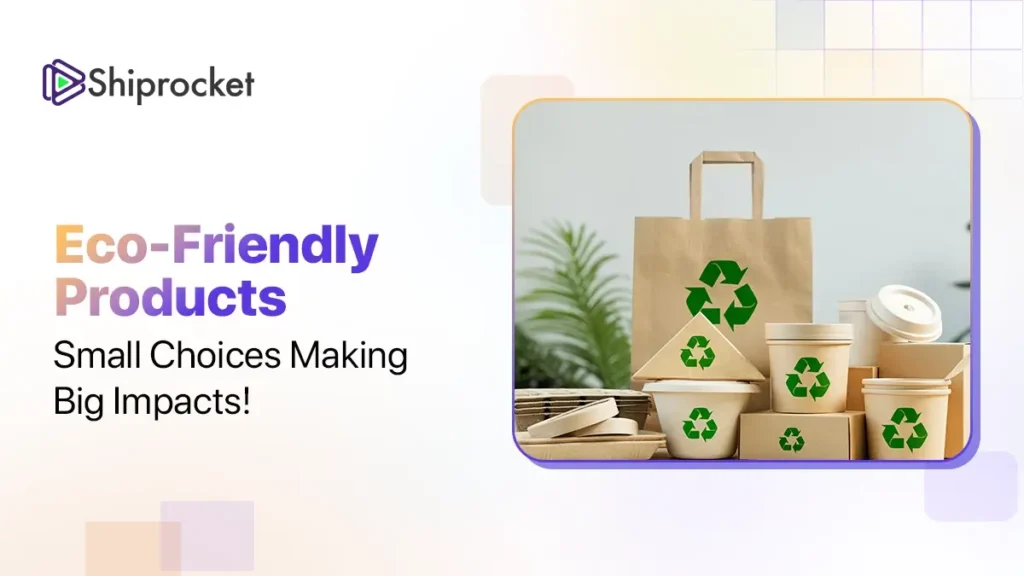Top 20 Eco-Friendly Product Ideas for Online Sellers in 2025
Approximately 62% of consumers today are willing to switch to sustainable brands, and 66% of customers are ready to pay more for eco-friendly products.
The market and consumers today aren’t just shifting but demanding change! You can see it as just a trend, but it’s a massive business opportunity. Shoppers today are aware of and actively look for brands that align with their values and products that reduce environmental harm. Adopting eco-friendly products can set your brand apart while contributing to a greener planet, whether it’s biodegradable packaging, reusable alternatives, or sourcing materials
This blog explores how making small and sustainable choices can leave a huge impact on the environment and your business’s growth.

What Are Sustainable Products?
Sustainable products are items designed to reduce environmental impact throughout their life, from sourcing and production to usage and disposal. Unlike traditional/ conventional products, sustainable products prioritise eco-friendly materials and ethical production practices, and reduce waste while manufacturing them.
Materials That Are Kind to The Planet
Choosing the right materials is the base of sustainable products. As environmentally conscious consumers grow more selective and choosier, you must prioritise durable and environmentally responsible materials. Integrating these materials will help you increase your brand’s credibility and appeal to conscious consumers. Here is a list of some of the top sustainable materials:
- Bamboo: It is a highly renewable resource and grows up to 35 inches per day without excessive water and pesticides. It is naturally biodegradable, strong, and versatile, which makes it perfect for clothing and kitchenware to furniture and packaging. It has antibacterial properties that make it an excellent alternative to plastic.
- Recycled Plastics: With more than 400 million metric tonnes of plastic waste generated annually, recycling plastic is a smart way to repurpose existing materials. By changing discarded PET bottles, fishing nets, and industrial waste into new products, you can reduce landfill waste and carbon emissions while providing durable and stylish products like packaging, accessories, and apparels.
- Organic Cotton: Regular cotton cultivation uses 16% and 6% of the world’s insecticides and pesticides each year, respectively. Organic cotton is grown without any toxic chemicals, making it safe for the environment and customers. Organic cotton needs less water, which also reduces soil degradation and results in soft and more breathable fabrics.
- Hemp: Hemp is the most sustainable natural fibbers that needs comparatively less water than cotton and doesn’t require any fertilisers or pesticides. It is durable, biodegradable, and versatile for different uses like biodegradable plastics, paper, and even construction materials. Hemp has the ability to regenerate soil and absorb more CO2 per acre than trees, which makes it an excellent material for sustainable businesses.
- Cork: Cork is harvested from the bark of cork oak trees without harming them and allowing continuous regrowth. It is lightweight, water resistant, and has biodegradable properties, which makes it perfect for fashion accessories, home décor, and eco-friendly packaging.
- Plant-Based Bioplastics: It is derived from renewable sources like sugarcane, cornstarch, and algae. Plant-based bioplastics break down faster than petroleum-based plastics and reduce pollution. Plant-based bioplastics have gained popularity in packaging, disposable cutlery, and electronics casings industries while offering sustainable solutions without compromising any functionality.
- Recycled Steel: Steel is one of the most recycled materials on the planet. By choosing recycled steel, you can reduce energy consumption by 74% in comparison to producing new steel while maintaining the strength and life needed of the steel for construction, furniture, and household appliances.
How do Sustainable Products Help Reduce Waste?
Waste generation is a growing concern. As a seller, offering sustainable products is not just an ethical choice but also a smart business move that aligns with changing consumer preferences and global sustainability goals. Here is how sustainable and eco-friendly products can contribute to waste reduction:
- Encourage reusing things over disposing them as there are many sustainable products designed to replace the single-use items like shopping bags and refillable beauty products.
- Biodegradable products like bamboo, cork, and plant-based bioplastics decomposes naturally, which reduces long-term pollution. Sustainable products made from these materials ensure they don’t harm the planet when they reach the end of their life.
- Brands today are embracing upcycling and repurposing everything. For instance, fashion brands are creating sneakers from plastic waste, furniture is being made from reclaimed wood, bags and accessories are manufactured from old seatbelts and banners, etc.
- Using recycled materials minimises the need for new raw materials, cutting down the energy consumption and emissions.
- Sustainable packaging is changing the eCommerce and retail industries. Brands now are offering paper-based and mushroom-based packaging as an alternative to Styrofoam, compostable mailers made from cornstarch, and edible cutlery and food packaging to eliminate waste entirely.
The Role of Fair and Responsible Manufacturing
Sustainability isn’t just about the materials used but also about how the products are made. Fair and responsible manufacturing ensures eco-friendly products that are good for the planet and business. Adopting these ethical production practices, you can strengthen your brand’s credibility and align with the values of conscious customers.
- Ethical and sustainable brands prioritise fair pay and safe conditions, and reject labour exploitation.
- Using renewable energy, reducing water waste, and cutting emissions makes manufacturing greener. Sustainable processes attract conscious customers.
- Choosing local and certified suppliers reduces carbon footprints and supports ethical trade.
- Modern customers demand proof of sustainability; you can use blockchain and traceability solutions to gain customers trust and stand out.
20 Sustainable And Eco-Friendly Products to Sell In 2025
As sustainability becomes a priority for customers, you can offer eco-friendly alternatives to gain a competitive advantage. Here are trending 20 sustainable products that you can consider selling in 2025:
Fashion and Accessories
- Recycled or upcycled jewellery: Unique, stylish, and made from repurposed materials.
- Organic cotton tote bags: A reusable and biodegradable alternative to plastic bags.
- Recycled cotton clothing: Fashion which reduces water and water consumption.
Personal Care and Wellness
- Biodegradable toothbrush: Made from bamboo or cornstarch-based materials.
- Refillable deodorants: Sustainable packaging with natural ingredients.
- Shampoo and conditioner bars: Long-lasting, plastic-free hair care.
Home and Kitchen Essentials
- Reusable food wraps: Beeswax or vegan alternatives to plastic wrap.
- Bamboo utensils: Lightweight, durable, and compostable cutlery.
- Glass food containers: A non-toxic, reusable alternative to plastic.
- Compostable trash bags: Made from plant-based materials to reduce any landfill waste.
Kids and Pet Products
- Wooden toys: Non-toxic and plastic-free playtime essentials.
- Non-toxic crayons: Safe for kids and free from any harmful chemicals.
- Pet toys made from recycled plastic bottles: Reduces plastic waste while keeping pets entertained.
- Cloth diapers: Reusable, soft, and gentle on the environment.
Sustainable Lifestyle and Travel
- Eco-friendly water bottles: Reusable stainless steel or glass bottles.
- Stainless steel or bamboo straws: A durable replacement for plastic straws.
- Solar energy devices: Solar-powered chargers, lights, and gadgets for off-grid convenience.
Energy and Water Conservation
- Water-saving shower heads: Reduces water usage without compromising performance.
- Recycled sunglasses: Stylish eyewear made from repurposed plastic or ocean waste.
- Energy efficient appliances: Low energy consumption that also minimises carbon footprints.
Eco-Friendly Shipping: How Shiprocket Supports Greener Deliveries
Sustainability in logistics is no longer a trend but a need. With the eCommerce industry booming, the environmental impact of packaging waste, carbon emissions, and inefficient shipping methods has become a major concern. Shiprocket is leading the way with green logistical solutions as you strive to reduce ecological footprints.
- Carbon-neutral shipping options to offset your carbon emissions by investing in renewable energy and reforestation to balance emissions from deliveries.
- AI-powered logistics to ensure deliveries take the shortest and most efficient routes while reducing fuel consumption and cutting down major carbon footprints.
- By consolidating shipments and optimising load capacity, Shiprocket reduces the number of trips required, which leads to low fuel usage and emissions.
- You can opt for biodegradable, recycled, or minimal packaging, which helps you to reduce plastic waste and promote eco-friendly shipping.
- Automated invoicing, digital receipts, and online shipping labels reduce paper waste, making logistics operations smooth and more sustainable.
Conclusion
Modern consumers are making conscious choices, and businesses that adapt to this shift stand to gain the most in this market. Offering sustainable products that reduce environmental impacts and help build a brand is an ideal choice. From ethical sourcing to green logistics, every sustainable choice adds value to your business and the world around us.
So, leap into sustainability today and create a brand that stands out while making a difference!






